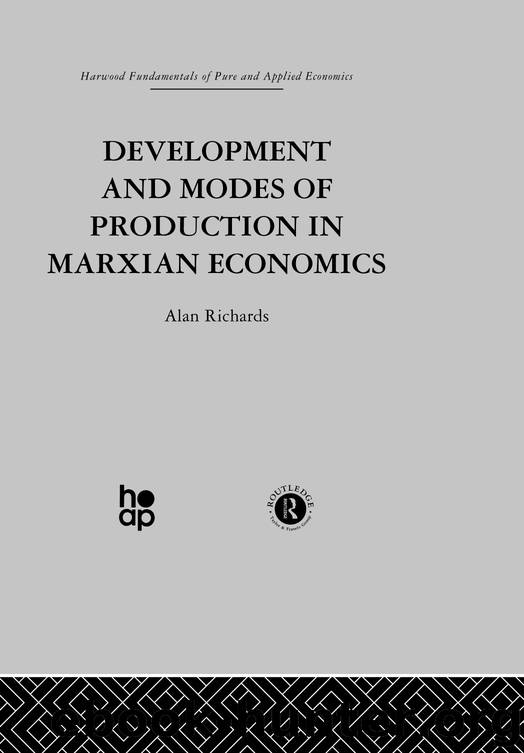Development and Modes of Production in Marxian Economics by Unknown

Author:Unknown
Language: eng
Format: epub
ISBN: 978-1-136-46417-1
Publisher: Taylor & Francis (CAM)
FIGURE 3 Source: Alain de Janvry: The Agrarian Question and Reformism in Latin America. Baltimore and London: Johns Hopkins University Press, 1981, 205.
Indeed, it is sometimes argued that the effect on the “non-reform” sector is even greater than on the “reform” lands. In most cases landlords could sell their lands before expropriation. Such a process contributed mightily to the consolidation of the class of relatively well-to-do peasants in land reforms as distant in space and time as the Prussian reforms of the early 19th century and the reforms of Nasser and the Shah of Iran. States, then, have used land reforms to eliminate old landed elites entirely, to induce such elites to become commercial or industrial capitalists, and/or to strengthen the class of rich peasants. A Marxist typology of land reforms, differentiated by mode of production before and after the reform, by the “control” of the state and by the distinction between different types of agrarian capitalism is provided by de Janvry in [26] (see Figure 3).
Such land reforms not only remove old landlords and promote agrarian capitalists, but also contribute to the creation of a proletariat. Indeed, land reforms have often been considered as a kind of “enclosure movement”52 which, by concentrating and simplifying formerly diffuse and complex property rights over land, effectively expropriated marginal rural families. In many land reforms (e.g., Prussia, Iran, Chile), it has been common to limit redistribution of land to peasants with access to certain other agricultural inputs, such as draft animals. In Egypt, only tenants, not daily or seasonal agricultural laborers, received land. In Michoacan in Porfirian Mexico, privatization of formerly communal marshes undermined peasant livelihood by depriving them of fish and fowl to eat and reeds to weave and sell. The fate of English “cottagers” or small peasants (“before enclosure… a laborer with land, after enclosure… a laborer without land”, [163, p. 76]) has been repeated around the world. There can be little question that states have “created” classes through the open redistribution of land [241, 296, 177, 77, 150].53
The state may also make classes by redistributing non-agrarian assets. Nationalizations of commercial and industrial assets may remove the foreign bourgeoisie as in Egyptian nationalisations under Nasser or expropriate local, but ethnically distinct, entrepreneurs as in East Africa, or simply remove local entrepreneurs as in Syria [138]. Such actions may not entirely eliminate such proprietary interests as a class, however, as the Syrian case indicates. There the expropriated classes typically reoriented their economic activities, moving into new, permitted areas of private activity, especially trade. But in any case, such nationalizations typically initiate a process of class creation, as state bureaucrats and managers emerge as a “new class” over time. If they are successful, if they forge personal and business ties with whatever remains of the former proprietary classes, they may in time increasingly act as a class in their own right, and demand a greater share of decisionmaking power. Such processes are visible in countries such as Egypt, Algeria, Turkey, and the Republic of Korea.
Download
This site does not store any files on its server. We only index and link to content provided by other sites. Please contact the content providers to delete copyright contents if any and email us, we'll remove relevant links or contents immediately.
Pale Blue Dot by Carl Sagan(4995)
The Rules Do Not Apply by Ariel Levy(4956)
Goodbye Paradise(3798)
Ogilvy on Advertising by David Ogilvy(3599)
Liar's Poker by Michael Lewis(3440)
Delivering Happiness by Tony Hsieh(3417)
Into Thin Air by Jon Krakauer(3384)
Purple Cow by Seth Godin(3195)
Rogue Trader by Leeson Nick(3039)
The Social Psychology of Inequality by Unknown(3014)
The Airbnb Story by Leigh Gallagher(2850)
4 - Harry Potter and the Goblet of Fire by J.K. Rowling(2698)
The Mind Map Book by Tony Buzan(2570)
Bossypants by Tina Fey(2524)
Claridge's: The Cookbook by Nail Martyn & Erickson Meredith(2398)
All the President's Men by Carl Bernstein & Bob Woodward(2362)
Six Billion Shoppers by Porter Erisman(2295)
Master of the Game by Sidney Sheldon(2282)
Alibaba by Duncan Clark(2076)
